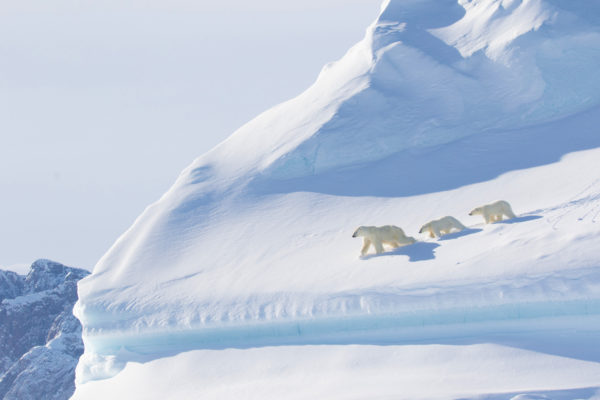Executive Magazine; Sept 1, 2007
Text Peter Speetjens
The times they are changing, and they are changing fast. At the turn of the 20th century Frederick Cook and Robert Peary had to spend weeks on end in sledges and lost many a toe to frostbite in their race to become the first to reach the North Pole. It now seems likely that by the end of the 21st century one will simply be able to call a travel agency and book a cruise across the Arctic.
Research shows that the northern ice cap in summer is some 20% smaller than it was 30 years ago and, if this trend is to continue, there may be no ice at all by 2075, much to the chagrin of the Arctic’s polar bears. Having to live with longer summers and less ice, the white giants already face great difficulties in catching their beloved seals and have turned to cannibalism and infanticide to survive. In fact, life has become so bad, that Ursus Maritimus is on the brink of extinction.
With the arguable exception of planet White House, it is widely accepted that the melting of the Arctic is to a large extent due to global warming. Yet where the common man mainly sees problems, his leaders see but opportunities!
Sure, they too feel sorry for the polar bears, but within the bigger picture the melting ice is a true blessing in disguise, as the Arctic sea is extremely rich in fish and, according to a study by the US Geological Survey (USGS), could be home to an estimated 25% of the world’s untapped oil and gas reserves. Not to mention gold, diamonds, metal ore and other minerals!
Some 100 years after Cook and Peary’s dash to glory at the North Pole, the Arctic’s five neighboring countries — Russia, Canada, Norway, Denmark and the US — have entered a race to be the first to lay their hands on the riches underneath. Denmark is of course not directly linked to the Arctic, but in a previous round of the great land grabbing game, the tiny kingdom planted its flag on Greenland and declared its sovereignty over 2 million square kilometers of ice and snow, as well as a few thousands of Inuit hunting whales.
The problem with the Arctic is that, unlike the Antarctic, it is not governed by an international treaty. The Arctic is essentially open sea, which belong to all the world’s nations. However, according to the United Nations Convention on the Law of the Sea, nations can claim a 200-mile economic zone and, in addition, lay claim to part of the continental shelf. The extent to which they can do so is determined by a set of formulas dependent on the seafloor.
As a consequence, each of the five competitors has teams of scientists studying the nature of the ocean floor. Russia is currently leading the pack. It claims that the ocean floor is an extension of the Eurasian continental shelf. As soon as the United Nations established the “Commission on the Limits of the Continental Shelf” to deal with the world’s seabed grabbing game, Moscow immediately claimed about half the Arctic. Never a fan of international treaties, Washington refuses to acknowledge the international body.
What’s more, Russia last month sent the Akademik Fyodorov, the country’s research flagship, accompanied by a nuclear-powered icebreaker and eight helicopters into the Arctic sea. The ship’s scientists sent a miniature submarine to the seabed, some 2,500 meters below the ice, to deposit a titanium capsule with a Russian flag in it.
Canada, another major contender, currently ranks second. It aims to expand its territory by up to one third. Not in the possession of major icebreakers, it recently announced to acquire eight military patrol boats that are able to penetrate ice up to one meter thick. Denmark comes third and is at loggerheads with Canada over an icy rock called “Hans Island”.
Both countries have planted their flags on the isle and even sent warships to assert their claims. The United States currently rank fourth and has promised to announce its Arctic claim soon. In fifth place comes Norway, which has so far been the most silent of the lot.
Man is blessed with the faculty of reason, so we were taught at school, yet the older one gets, the more one is convinced that is the greatest myth ever invented. To start a race for fossil fuels in the Arctic, as its ice is melting due to the burning of fossil fuels, must be the ultimate illustration of man really being a greedy, short-sighted opportunist. As sea levels are rising and deserts expanding, keep in mind that Cook and Peary, despite their claims, actually never made it to the North Pole.
